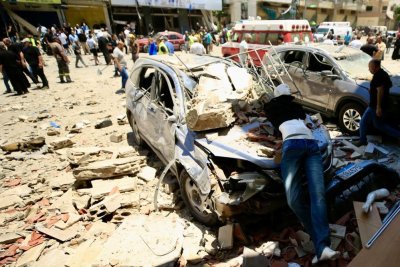
Emergency services and residents inspect the scene of an airstrike in the town of Nabatieh, southern Lebanon, on June 25. The United Nations has warned that war-torn Lebanon is at “a turning point” and must undertake urgent and immediate recovery efforts. Photo by EPA
BEIRUT, Lebanon, July 24 (UPI) — The United Nations has warned that war-torn Lebanon is at “a turning point” and must undertake urgent and immediate recovery efforts to avoid prolonging its six-year multifaceted crisis that has been exacerbated by the recent Israel-Hezbollah war, according to a U.N. report released Thursday.
The report, prepared by the United Nations Development Program and United Nations Economic and Social Commission for Western Asia, in collaboration with other U.N. agencies, highlighted the devastating impact of the Israel-Hezbollah conflict — that began Oct. 8, 2023, and escalated in September 2024 — by examining its effects on Lebanon’s economy, infrastructure and society.
More than 4,285 people, including 292 children and 861 women, have been killed and some 17,200 wounded as of Jan. 9. Since the Nov. 27 cease-fire agreement took effect on Feb. 18, an additional 200 people, including civilians and Hezbollah operatives, also have been killed.
The war, moreover, displaced over 1.2 million people, damaged or destroyed nearly 64,000 buildings and disrupted education for hundreds of thousands of students, according to the U.N. report.
It indicated that micro, small and medium-sized enterprises, which make up 90% of Lebanon’s economy, were hit especially hard: 15% shut down permanently, 75% suspended operations during the war and nearly 30% lost their entire workforce.
In the most heavily bombed areas, up to 70% of businesses were forced to close permanently.
Moreover, about 500,000 students experienced severe educational disruptions during the war, with 69% of children out of school until the cease-fire. Child nutrition also reached critical levels, particularly in the eastern Baalbek-Hermel and Bekaa governorates, where more than 51% and 45% of children under the age of 2, respectively, suffered from severe food shortages.
Some 1.6 million people are expected to face high levels of acute food insecurity, including 928,000 Lebanese citizens, the report warned.
The proportion of Lebanese citizens living below the poverty line more than tripled between 2012 and 2022 — rising to 33% from 11% — and that the 2024 war, particularly in eastern and southern Lebanon, further exacerbated poverty.
Moreover, the war significantly deepened Lebanon’s labor market crisis. During the conflict, employment among private sector workers declined by 25%. In the areas most heavily affected by bombardments, 36% of workers lost their jobs, compared to 17% in regions less impacted. Even after the cease-fire, 14% of workers remained unemployed.
The report explained that the economic impact has been profound, with Lebanon’s economy contracting by 38% between 2019 and 2024, while the country’s Human Development Index fell back to 2010 levels; marking a 14-year setback caused by the compounded effects of the crisis and war.
Key sectors of the economy have been severely affected, including tourism, agriculture, manufacturing, trade and finance. The tourism sector has taken a significant hit, with its contribution to the economy in 2024 expected to have declined to just 5.5%.
“Lebanon is at a turning point,” said Blerta Aliko, the resident representative of the U.N. Development Program in Lebanon, emphasizing the need for Lebanon to shape “a nationally led recovery plan.”
Aliko said it was imperative that “state institutions are strong and well-equipped” to drive a sustainable and inclusive recovery process.
The report indicated that a reform-driven recovery could help reverse the economic decline, with projections estimating GDP growth of 8.2% in 2026 and 7.1% in 2027. However, even with these necessary reforms, GDP would remain 8.4% below its pre-crisis 2017 peak of $51.2 billion. To sustain recovery, key sectors such as agriculture, construction, tourism and manufacturing must be prioritized, it said.
It recommends the Lebanese government to focus on four key areas for its recovery: rebuilding and strengthening state institutions; revitalizing the economy and generating employment; restoring basic services and expanding social protection; and rehabilitating damaged environmental ecosystems.
Tarik Alami, the economic and social commission cluster leader on governance and prevention, said Lebanon continues to face a “polycrisis” that was made worse by the recent devastating war.
“This critical juncture calls for the urgent and accelerated implementation of essential reforms; particularly within public administration, as well as across socio-economic and financial sectors,” Alami said.
He emphasized that “the root causes of recurring hostilities along Lebanon’s southern border must be addressed decisively and sustainably,” in full accordance with international law and relevant U.N. resolutions.
The U.N. report noted that Lebanon’s path to recovery requires urgent, coordinated action between the government, donors, U.N. agencies and non-governmental organizations, while substantial financing will be required from domestic resources, private sector investments, international development assistance and foreign direct investment.
“Without immediate intervention, economic rebound will take longer, poverty will deepen, state institutions will further weaken and Lebanon’s social stability will be at risk,” it warned.
Last March, the World Bank estimated that Lebanon would need $11 billion for its reconstruction and recovery needs after the Israel-Hezbollah war.
However, any international or Arab financial support remains unlikely unless Lebanon implements the necessary reforms and fully disarms Hezbollah — a condition Israel has set as a prerequisite for halting its ongoing attacks on the country.